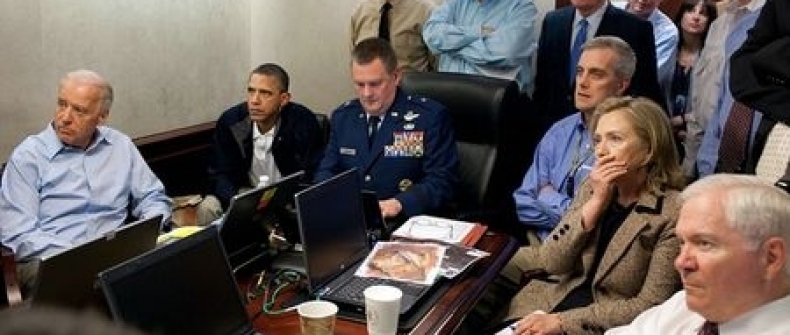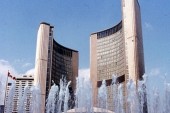
There is no question that President Obama is vulnerable to electoral defeat this fall. The American economy continues to lag, and as president, Obama invariably must shoulder some of the blame. His aloof, professorial style has not meshed well with a Congress that is as polarized as ever, and he has not figured out a way around political inertia. Even when he has made history, such as in his announcement of support for same-sex marriage several weeks ago, he has seemed to be more reactive than visionary.
Ironically, however, you don’t hear a lot of criticism on the subject in which Obama was probably most questioned the first time he ran for president: national security. The reason for this shift became very evident to me as I was reading Peter Bergen’s fascinating new book on the assassination of Osama bin Laden, called Manhunt: The Ten-Year Search for Bin Laden from 9/11 to Abbottabad.
The book, meticulously researched by Bergen, a leading international author and journalist, and based on interviews with many top officials in the U.S. and around the world, makes clear what Mitt Romney and Republicans have gone to great lengths to dispel: just how crucial Obama’s leadership was to the mission of finding and killing the world’s most wanted criminal.
Obama himself actually anticipated just how we would handle the mission when he was still considered a long-shot candidate during a 2007 speech in Washington: “If we have actionable intelligence about high-value terrorist targets and (Pakistan) won’t act, I will not hesitate to use military forces to take out terrorists who pose a direct threat to America.” This, of course, is precisely what wound up happening four years later.
The comments, however, opened Obama up to ridicule from his more experienced rivals for the Democratic nomination, such as Chris Dodd and Hillary Clinton, who would soon launch her famous “3 A.M.” campaign ad that directly challenged Obama’s national security credentials.
Perhaps most critical was the Republican presidential nominee, John McCain, who appealed to the American people: “Will we risk the confused leadership of an inexperienced candidate who once suggested bombing our ally, Pakistan?” Obama shrewdly shot back at McCain at the 2008 Democratic National Convention: “John McCain likes to say that he’ll follow bin Laden to the gates of Hell, but he won’t even follow him to the cave where he lives.”
Obama followed up this rhetoric almost immediately upon taking office. Three days after his inauguration, he authorized a campaign to intensify drone strikes in the tribal regions of Pakistan. Soon after, he directed CIA director Leon Panetta to provide a detailed operational plan for finding bin Laden, and asked for regular updates on the search at weekly national security meetings. American officials were of course already expending great effort in the hunt for the Al Qaeda leader, but Obama succeeded in adding a new immediacy to the process: it became a source of embarrassment to not bring any new information about bin Laden to intelligence briefings.
Obama’s other early change was to re-frame the U.S. campaign from the Bush-era “War on Terror” to what he termed a “war against Al Qaeda and its allies.” This had the advantage of shifting the focus from a vague and intangible enemy, which many in the Muslim world also found accusatory, to a specific adversary that could be isolated and rooted out. Towards the end of his life, bin Laden himself bemoaned this shift and the damage it had done to the Al Qaeda “brand”, and consequently plotted to assassinate Obama and replace him with the “unprepared” Joe Biden.
When the U.S. finally had a lead on bin Laden’s possible location after tracking one of his couriers to the suburb of Abbottabad, Obama’s decisive leadership was perhaps most on display. American intelligence never had any kind of certainty that bin Laden was in the compound; all they really knew was that the fortress-like character of the facility was conspicuous and mysterious, that a man of bin Laden’s general physical stature was there, and that the number of women and children on-site was generally consistent with what was known about bin Laden’s family. As Obama himself articulated, what if the man they were surveying “was a prince from Dubai just keeping a low profile?”
As American officials discussed the prospect of a raid, the lingering uncertainty manifested in general disagreement about what to do. Some of Obama’s most senior and experienced advisors, including Vice President Joe Biden and Defense Secretary Robert Gates, counseled the president to hold off on the mission. The intelligence was too vague, they said, and if anything the U.S. should bomb the compound from the sky rather than risk putting American forces on the ground and invariably fraying relations with Pakistan.
Obama, however, was willing to roll the dice. The intelligence on bin Laden was likely never going to be 100%, he argued. The Al Qaeda leader was too cautious and cagey to just reveal himself to observers of the compound. The bombing option had its advantages and many proponents, but Obama felt uncomfortable for two reasons: there were no guarantees of a precision strike, and- most problematically- the U.S. would not be able to officially and conclusively identify bin Laden’s body. Instead, Obama authorized the SEAL team raid, much to the surprise of many of his closest advisors.
Obama also ensured his troops had the support to succeed in the mission, no matter what the obstacles. Originally the military leaders, mindful of the possibility of Pakistani forces coming to the compound, came up with a plan that would seek to avoid conflict with Pakistan. In the event the Pakistanis showed up, the Americans would create a defensive perimeter until they could escape the compound without incident.
It was Obama, known to his critics as an international idealist, who went to Admiral William McRaven and said, “the premium is on the protection of our force, not on keeping the Pakistanis happy.” He instructed the military to be prepared to fight its way out of any scenario, including a battle with Pakistani security forces.
Finally, when the mission was in progress and the inevitable surprise setback occurred, Obama never wavered. In this case, one of the two SEAL team helicopters involved in the mission crashed inside the Abbotabad compound, and Admiral Mike Mullen recalls his great concern that “someone at the White House would reach in and start micromanaging the mission.” Obama had faith in the contingency planning that was in place and let the mission proceed.
The rest, of course, is history. Clearly, the finding and killing of Osama bin Laden was years in the making and the product of an unprecedented collective effort from many people in American government, intelligence and the military. What Manhunt makes apparent, however, is just how crucial Obama’s calm and decisive leadership was in putting all the pieces of the puzzle together and ensuring that a smart and aggressive strategy was in place.
What strikes me most, however, is that in retrospect, nearly every decision Obama made throughout the process was the right one, and his resolve in sticking to his guns despite the various obstacles was extremely impressive. These were not easy decisions, and I question whether any other American leader would have made the same choices. In this election year, however, what remains to be seen is whether Obama can bring the same kind of leadership to the rest of his administration.
____
Matthew Frisch writes Foreign Desk for Toronto Standard. Follow him @mfrisch.
For more, follow us on Twitter at @TorontoStandard and subscribe to our newsletter.














